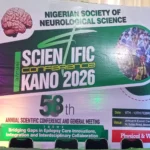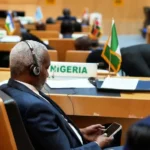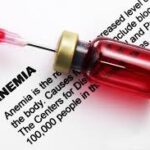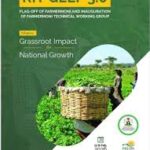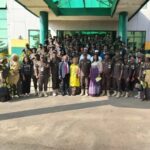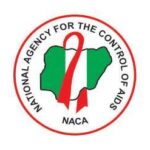By Abujah Racheal
Key stakeholders tackling Antimicrobial Resistance (AMR) in Nigeria have underscored the need for a two-pronged approach.
They advocated addressing informal drug dispensing in communities and empowering young people through structured, multi-sectoral education to curb the growing AMR threat.
The stakeholders spoke on Thursday in Abuja at the Africa CDC Western Africa Regional Coordinating Centre’s Regional Review Meeting on Antimicrobial Stewardship and AMR Surveillance Systems.
The News Agency of Nigeria (NAN) reports that the meeting brought together experts, technical partners and country representatives to assess on progress so far made in tackling AMR and promote regional collaboration.
Mrs Estelle Mbadiwe, a pharmacist with Ducit Blue Solutions, drew attention to the widespread dispensing of antibiotics by unlicensed vendors in rural and peri-urban communities, highlighting the gap between policy and practice.
“These vendors aren’t authorised to prescribe antibiotics, yet they do. The disconnect between regulation and reality is one of the biggest drivers of resistance,” she said.
Mbadiwe added that awareness remains low, especially among the elderly, who often identify medications by colour or packaging rather than name or diagnosis.
She stressed, “We must work from both ends, tightening control on informal dispensing and equipping future generations with the tools to prevent resistance.”
In contrast, Ms. Oluwatoni Akinola, AMR & IPC Programme Officer at the Dr Ameyo Stella Adadevoh Health Trust (DRASA), emphasised that DRASA’s model focuses on inclusion, community ownership and multi-sectoral engagement, especially in education.
“We’re co-developing an AMR curriculum for communication and we’re not doing it in isolation.
“We’re engaging key stakeholders like the Ministries of Agriculture and Environment to ensure that we don’t focus solely on human health,” Akinola said.
She further explained that both urban and rural schools, including public and private institutions, were being considered in the pilot phase of the curriculum, ensuring broad access and equitable learning.
She also introduced DRASA’s Youth-Led One Health Pilot Project, which is currently open for applications via the organisation’s website.
“The goal is to build the capacity of youth-led organisations and individuals to understand and implement one health strategy in their communities.
“Eventually, we want them to become part of structured one health programme effort nationwide,” she said.
According to her, DRASA’s wider efforts have already seen more than 69,000 youth trained as health champions across 32 states, with students leading peer education initiatives in schools, homes and communities.
She added, “Our approach is people-centred and system-oriented. Only when every sector is involved and every young person empowered, can we break the cycle of antimicrobial resistance.”
Ms. Fauzia Mohammed, AMR focal person at Africa CDC, stressed the role of youth-led civil society groups in harmonising data and expanding AMR initiatives continent-wide.
“We are looking into interstate mobility and how best to scale this youth-led coordination. These groups help harmonise data, share a common position and engage media and civil society as clusters in the work we do,” she explained.
Mohammed further highlighted Africa CDC’s holistic strategy since its establishment in 2017: leveraging its role as a political and technical institution within the African Union system to include civil society and non-state actors in key processes.
She noted: “Civil society organisations and media are integrated into the development of strategic documents, whether for the African Union AMR framework or during events like the UN General Assembly. Engagement is essential for sustainable impact.”
She also referenced ongoing initiatives to build capacity such as training journalists across the continent, supporting national AMR school tools, mobilising resources and co-developing campaigns for World AMR Awareness Week.
On his part, Mr Abara Erim, RCCE Technical Officer Africa CDC, said that the agency’s regional review aimed to assess progress in implementing Antimicrobial Stewardship (AMS) and AMR surveillance systems across West Africa.
Erim said that it also sought to identify capacity gaps, share innovations and best practices among countries and strengthen regional collaboration through the establishment of a Community of Practice on AMR and AMS.
NAN notes that AMR is when germs such as bacteria and viruses stop responding to the medicines meant to kill them.
This makes infections harder to treat, increases health risks and mainly occurs due to the misuse and overuse of antibiotics.
Health experts said that people should prevent AMR because it makes infections harder to treat, increases the risk of death and can render medicines useless, adding that prevention protects everyone’s health. (NAN)(www.nannews.ng)
Edited by Francis Onyeukwu

